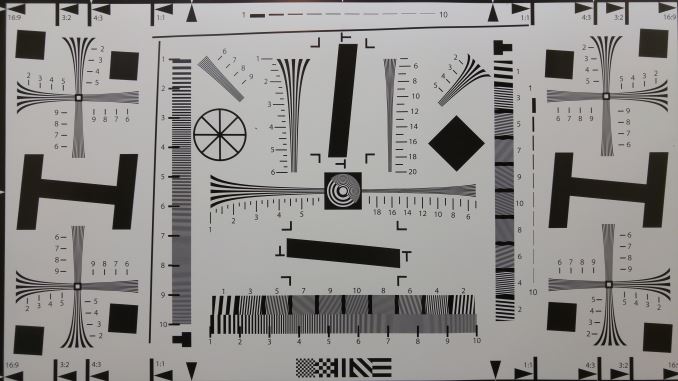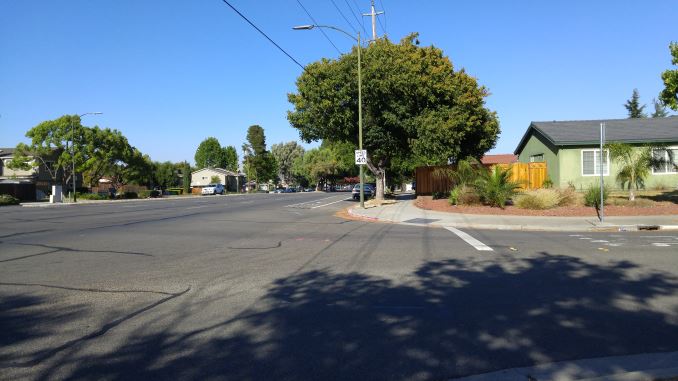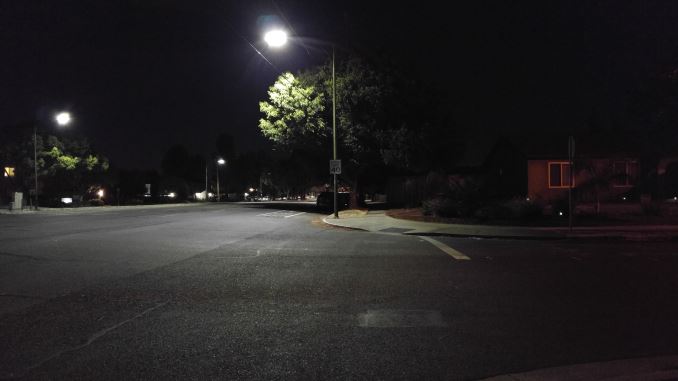The LG G4 Review
by Joshua Ho on July 30, 2015 10:00 AM EST- Posted in
- Smartphones
- Qualcomm
- LG
- Mobile
- Snapdragon 808
- LG G4
Still Image Performance
Now that we’ve been able to discuss the basic specs of the camera and the user experience of taking photos, we can begin to talk about the image quality of the camera system. This is an incredibly complex field to say the least, as there are many parts of the chain that have a significant impact on overall quality. In order to test this, we use relative photo comparisons which allow for some level of objective comparison in terms of optical distortions, MTF, and other factors that influence image quality. I’m still not satisfied with the state of our testing suite here, but for rough comparisons it should serve well.
In our ISO test chart, the G4 effectively has no problem resolving anything on the test chart, but the contrast between lines can get rather low by the time we reach the 20 mark on this graph. However, resolution at the center isn't the only part that matters, but rather resolution at the edges. In that regard it appears that the G4 has some issues with defocus and noise at the edges that is slightly worse than the Galaxy S6, but it's definitely possible that we're just looking at differences in post-processing as the haloing is definitely slightly more obvious on the G4 around all the high-contrast edges in this photo.
Moving past our controlled lighting tests, we use some real-world estimations to try and judge more than pure resolution. In our daytime landscape tests, the LG G4 is roughly equivalent to the Galaxy S6, but textures seem to have visibly lower resolution. Given the even more aggressive sharpening on the LG G4 compared to the GS6, it’s likely that we’re seeing differences in post-processing and possibly differences in optics as well. It’s worth noting here that the OIS has a tendency to drift even in situations that don’t appear to have any hand shake present, so this can also affect the sharpness of photos in daytime.
At any rate, resolution is effectively comparable to the LG G3, which is probably indicative that we’re mostly limited by the optics here, and that decreasing pixel size much further won’t really help with increasing resolution. HDR is pretty much similar in terms of quality to the Galaxy S6, but the use of multiple image combination affects the shot to shot latency as there’s additional processing time compared to the Galaxy S6’s instant HDR which affects the user experience. I should note that RAW output is effectively useless here as well, as there’s basically no lens or sensor profile so the colors of the RAW photo look rather off, in conjunction with vignetting and other distortions that are difficult to correct for.
In low light, the LG G4 is arguably far superior to the Galaxy S6 in terms of quality. Looking at the test images, a number of issues stand out in the Galaxy S6 that are resolved in the LG G4. The first is that the processing avoids artificially increasing exposure well past what the sensor has recorded, so there’s no purple hue in black areas like the sky and the right side of the image. The other significant advantage here is that LG’s noise reduction algorithms are much more balanced, favoring preservation of detail over smoothing out luminance noise. The speed limit sign is significantly more legible, and in general edges remain much sharper on the G4, and textures retain more detail than on the Galaxy S6. Given that detail seems to be a bit worse in daytime, it seems fair to say that LG has simply adopted better post-processing for low light photos, so these comparisons are definitely subject to change as OEMs adjust post-processing with various OTAs.
Overall, I’m actually quite impressed with what LG has done here. The camera UI is easily one of the best I’ve seen in any smartphone, and the camera is definitely much faster than the one on the LG G3. Shot to shot latency isn’t quite fast enough to feel instant, but it’s at least competitive with other devices on the market. Image quality is also competitive with the Galaxy S6 in the day, and noticeably better at night. Combined with the manual controls, I would argue that the LG G4 is a better camera than the Galaxy S6 and even the iPhone 6 Plus, although I would prefer a 4:3 sensor and a stronger focus on reducing optical distortion over chasing wider field of view and wider apertures for future iterations of the device.































84 Comments
View All Comments
Impulses - Friday, July 31, 2015 - link
I get that Anandtech is US centric to an extent, but with a lot of people in the US opting for contract-less plans to save money it might make sense to start factoring price into the equation when it comes to flagships... I wouldn't even have a clue if there are any significant differences, last phone I bought was the N5 and that was the first and only phone I've paid for in full w/o subsidy.tuxRoller - Thursday, July 30, 2015 - link
Such a shame Qualcomm didn't make the 808's cores faster (say, 2GHz) and equip it with at least the adreno 420.I understand why they didn't, and given the 810's design wins, their strategy clearly worked, but it still leads me to wonder "what if".
I wonder what's going on with their implementation of cci(assuming that's the culprit)? They've had enough experience by now to know how to properly implement a standard two tier cache system.
Buk Lau - Thursday, July 30, 2015 - link
if they boosted the 808 to higher clocks, which I'm sure they could since all they've been doing since 801 is just overclocking the chips, that would give OEMs more incentives to choose the 808 over the 810. let's say this, if the 808 comes higher clocked A57s and adreno 420, how many people do you think would even consider the 810? After all the 810 is much more profitable than 808. It just sucks to see how many OEMs got burnt by 810.in a sense, OEMs only have themselves to blame rather than qualcomm for having to release junk phones all over this year. back in the old days qualcomm's SoCs suffered even worse overheating and performance and yet OEMs still persist to use their stuff, simply because they offered an integrated modem
if they didn't spoil qualcomm so much back then, there wouldn't be so little choices in the SoC market with players like Texas instruments and others competing against qualcomm.
Impulses - Friday, July 31, 2015 - link
Don't NVidia and Intel have integrated modems at this point? They're still making SoCs, as is Samsung, seems there's still plenty of choices... We lost what, TI and Sony? I must be forgetting others, I remember lamenting the contracting SoC market too...whiteiphoneproblems - Thursday, July 30, 2015 - link
"It seems that these improvements have been enabled with the use of photoalignment technology, which shares similarities with photolithography but attempts to induce anisotropy in a photoresist analogue on a glass substrate..."Well, you won't see a sentence like that in Gizmodo.com...!
zodiacfml - Friday, July 31, 2015 - link
Another excellent review. Thanks. I also love it when you include many other phones such as the Nexus 5 and Moto G in the benchmarks.Good thing the dual core has real life advantages over the 810. The 8 core spec is nothing but marketing advantage.
As a camera enthusiast, I would also love the manual controls. Yet, I don't think I would use it too often as the control you could get doesn't add to much to the image quality. I mean, using HDR mode pretty much fixes the IQ weaknesses of smartphone cameras to dedicated, larger cameras. The worse noise in the corners probably indicates vignetting with the lenses, only it is fixed/lifted in processing.
Few months after release, the G4 is now slightly cheaper compared to S6 yet I don't think it is enough. The S6 still has a lot better value to G4 because of the display and SoC. The external build quality and video specs makes the S6 even higher. The only fault of the S6 is the small battery they included with it. The Note 5 surely will fix that but it's going to be much more expensive.
Mugur - Friday, July 31, 2015 - link
Nice review, although some phrases were a bit too strange for my taste..."One of the major points of emphasis for us in the smartphone space continues to be display, as even though you can replace a display on a phone, the only real reason to do so is if you shatter the glass cover of the display."
And, of course, I fully disagree with the claim that "the GS6 is roughly equal to or slightly worse than the iPhone 6 Plus as a camera overall". In my personal experience, the S6 camera is the best all-around camera, at least with auto settings and I'm not a Samsung fan...
victorson - Friday, July 31, 2015 - link
Hey Josh! You're fired.neo_1221 - Friday, July 31, 2015 - link
I got a laugh out of that too. :Dmpokwsths - Friday, July 31, 2015 - link
These ridiculous nand/storage benchmarks...